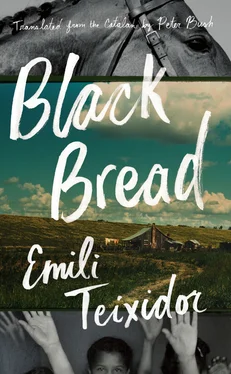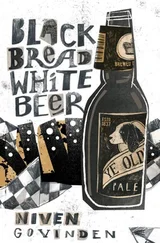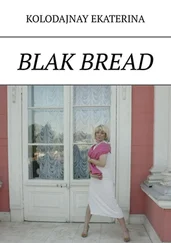Emili Teixidor - Black Bread
Здесь есть возможность читать онлайн «Emili Teixidor - Black Bread» весь текст электронной книги совершенно бесплатно (целиком полную версию без сокращений). В некоторых случаях можно слушать аудио, скачать через торрент в формате fb2 и присутствует краткое содержание. Год выпуска: 2016, Издательство: Biblioasis, Жанр: Современная проза, на английском языке. Описание произведения, (предисловие) а так же отзывы посетителей доступны на портале библиотеки ЛибКат.
- Название:Black Bread
- Автор:
- Издательство:Biblioasis
- Жанр:
- Год:2016
- ISBN:нет данных
- Рейтинг книги:3 / 5. Голосов: 1
-
Избранное:Добавить в избранное
- Отзывы:
-
Ваша оценка:
- 60
- 1
- 2
- 3
- 4
- 5
Black Bread: краткое содержание, описание и аннотация
Предлагаем к чтению аннотацию, описание, краткое содержание или предисловие (зависит от того, что написал сам автор книги «Black Bread»). Если вы не нашли необходимую информацию о книге — напишите в комментариях, мы постараемся отыскать её.
Born in 1933,
's first novel,
, was published to tremendous acclaim in 1988, followed by several more which established him as one of Spain's greatest contemporary authors.
Black Bread — читать онлайн бесплатно полную книгу (весь текст) целиком
Ниже представлен текст книги, разбитый по страницам. Система сохранения места последней прочитанной страницы, позволяет с удобством читать онлайн бесплатно книгу «Black Bread», без необходимости каждый раз заново искать на чём Вы остановились. Поставьте закладку, и сможете в любой момент перейти на страницу, на которой закончили чтение.
Интервал:
Закладка:
“Off you go!” Aunt Ció bid us farewell. “And don’t dally on the way, or the teacher will start crying.”
I found it odd our aunt was in a mood to say these things you usually say to young kids or when you want to crack a little joke.
Cry-Baby and I walked for a while, not exchanging a word. When we were round the first bend and the house disappeared behind the woods, I asked her: “What happened last night? Were you asleep all the time?”
“For a bit. But I woke up when Grandmother got up to talk to Aunt Enriqueta.”
“What happened?”
“I don’t know. I was half-asleep while they were whispering to each other. Then Aunt Enriqueta came over and kissed me. And Grandmother stayed in her rocking chair because she couldn’t get back to sleep.”
“Was Aunt Enriqueta by herself? What was she carrying?”
My cousin looked at me as if she didn’t understand my question.
“What do you mean, what was she carrying?”
“Suitcases or bundles of clothes.”
“Oh, I didn’t notice.” After a while, when she saw I didn’t persist, she piped up: “Oh, now I get you! Are you asking me because Quirze went to fetch Father Tafalla? Do you mean did I see the two friars? She was by herself. I saw nobody else.”
“The Saint Camillus friars must have returned to the monastery, I suppose.”
I knew more than she did. But for the moment I decided to tell her nothing, until I’d found out more. If what Quirze had said was true, they couldn’t conceal Aunt Enriqueta’s departure for much longer.
At school, Mr. Madern, the teacher, read us a story from a reading book, the title of which was The Last Lesson , one about the last lesson a teacher gives to pupils in a rural school, like ours, in a French province that had become German because of a war the French had lost — I couldn’t decide if it was the world war with the allies or fascists that preoccupied Grandmother so much or a previous war — and the teacher in the story, a Frenchman, was forced to leave the school because a German was on his way and would change everything, starting with the French language, that he’d replace with German; I didn’t understand how pupils and teachers could be at fault in the turmoil of that war, as if they were dead or wounded, or a mortar shell had fallen on the poor school, but I liked the story a lot because it moved me differently than the fireside tales about mischievous goblins, wondrous water-fairies or horrific crimes that Grandmother told, a new emotion flooded my heart and eyes with tears, one I’d never experienced before. Grandmother’s yarns were full of mystery and aroused my imagination, conjuring up marvellous worlds that, even though I knew they didn’t exist, seemed alive and fascinating in my mind and left an aftertaste like happy memories of a journey to unknown places you had never dreamed of, of fantastical excursions; on the other hand, that story about the teacher seemed for real, was surely true, I could understand and empathize with it, it spoke of people like Mr. Madern and me, and the story seemed to tell us something about what happens when a war is lost, the evil wrought by all wars, even if wars, guns and battles were never mentioned, and I understood there were struggles that were just as important as those fought in the trenches and invisible weapons that damaged the brain and the soul, like the French teacher’s sadness and his moving farewell, that also allowed me to glimpse the love the teachers felt for those forlorn children and the profound message embedded in their lessons, that didn’t simply help to teach us how to read and write, as Quirze and Oak-Leaf and most of the pupils in the Novíssima or the parish school thought, just as the teacher-priest wasn’t only teaching us the basics, but also wanted to make us good Christians, as he always said, which was why he obliged us go to mass and catechism, and I wondered why Mr. Madern was reading us that French teacher’s farewell speech to his pupils, what in fact did he want to get from us, and suddenly the image filled my mind of Núria with her skirts rucked up, the gentle slope of her belly and the pink mystery of her slit, and I felt rage as heavy as a lead weight stir in my belly against Mr. Madern, and the pity and tears I was feeling because it was his last lesson vanished and I began to hope with gritted teeth, in a kind of curse, that German soldiers would come and kick their way into that school, destroy the dais and carry the teacher off as a prisoner, drag him over the floor and cover the blackboard with insults, swear words and jibes against the French and French civilization , the word Mr. Madern was reading at that very moment, the whole of one civilization under the boot, and I laughed and fought my tears and that feeling of weakness, out, out, out.
I was shocked to find such hateful rancour within me, it was like the discovery of sex, an unexpected discovery, bewildering and magnetic, convulsing my entire body, taking me out of myself and leading me to strange new places where it was hard to keep a grip on the reins of reason, like when Quirze taught me to ride a horse without a saddle, bare-back, when you didn’t know if you could control the animal or where it would take you, yet at the same time, if you succeeded in taming and breaking it in, it gave you a magnificent sense of mastery over the world, of having all that strength and power in your hands, a communion between your upright, open body and the space around, that was transformed into the universe, the only one on the planet who counted, everything subject to your will, all power, all pleasure, all potency. All revenge.
I felt I ought to conceal that unexpected strength I’d just discovered on my last day at school, the final, true moral of the story, and use it when I needed to, at my convenience, just like sex, to help me keep away from my feelings the people I didn’t like or who wished me ill — beware of those who wish you ill, Grandmother always advised me, though she never specified which ill or which individuals we should be wary of — and also of those who didn’t fit my way of being or doing things, but above all it gave steely energy for self-defence, to forge breastplates of contempt and rejection against any who acted as my enemies, more secure, comforting protection than any good words and deeds I’d been taught in parish catechism classes, because it was a weapon that only depended on me, that nobody else had access to, I alone could recognize its potential and the determination impelling me to apply it.
I had to pretend: nobody must know I’d found that strength, like a solid, resistant rock within me I could produce when I wished, like the sexual secrets adults knew about and practised yet never mentioned, never spoke about in public, as if they didn’t exist. A wave of satisfaction coursed through my body and I reflected how this new ability to hate, to stand up for myself and say no, even if only silently, was a huge step forward on the road towards the conquest of the outside world, towards growing up.
In that maze of thoughts, driven by the discovery of that hidden vein of unspent fury, I missed the end of the story about the French teacher giving his last lesson in the region of Alsace-Lorraine before he left the school in the hands of the German authorities, I think that’s what Mr. Madern, our teacher, said, Alsace-Lorraine was the name of the provinces that had been lost, nor did I draw out the conclusion or moral— Faules i moralitats written by some canon or other and the Catecisme de la Doctrina Cristiana from the bishopric were the only books in Catalan I’d ever seen at school, remnants of the old town-hall library, the only ones saved from the bonfire they lit at the end of the war because almost all were on the list of books banned by the bishopric, written by atheist authors, Autores buenos y malos was a handbook the teacher-priest at the parish school used to consult and he laughed his head off when he mentioned the duly banned Don Impío Baroja and Don Miguel Unamierda, and the mere possession of such books at home, not even the act of reading them, led to immediate excommunication, ipso facto said the priest, ipso flauto we muttered, that meant expulsion from the brotherhood of all baptized Christians, they said, terrible grief that brought eternal condemnation simply for owning a book! and lending it to someone else was even worse, because that was to lead a soul into perdition, as if you were murdering someone, and there was no forgiveness from God for that; consequently, I could only guess what our teacher Mr. Madern had meant to imply by reading us that story.
Читать дальшеИнтервал:
Закладка:
Похожие книги на «Black Bread»
Представляем Вашему вниманию похожие книги на «Black Bread» списком для выбора. Мы отобрали схожую по названию и смыслу литературу в надежде предоставить читателям больше вариантов отыскать новые, интересные, ещё непрочитанные произведения.
Обсуждение, отзывы о книге «Black Bread» и просто собственные мнения читателей. Оставьте ваши комментарии, напишите, что Вы думаете о произведении, его смысле или главных героях. Укажите что конкретно понравилось, а что нет, и почему Вы так считаете.












